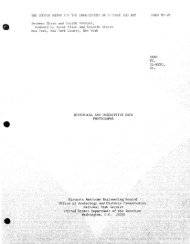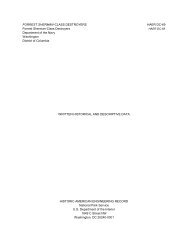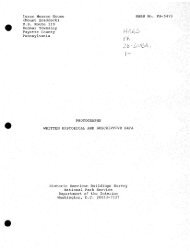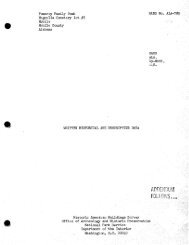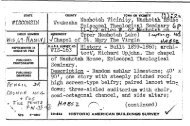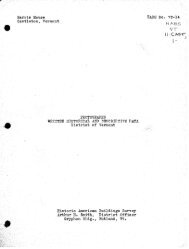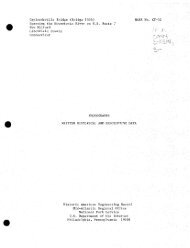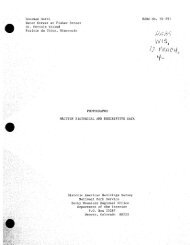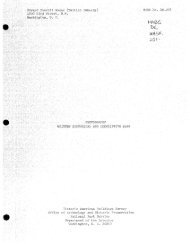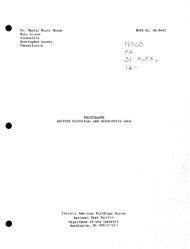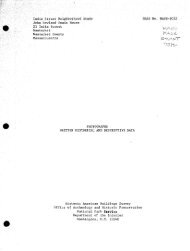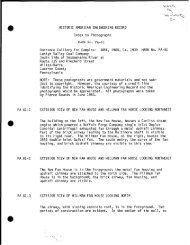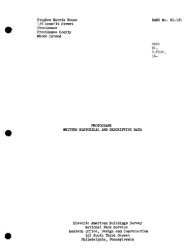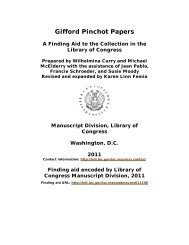pa1778data.pdf
pa1778data.pdf
pa1778data.pdf
Create successful ePaper yourself
Turn your PDF publications into a flip-book with our unique Google optimized e-Paper software.
U.S. STEEL DUQUESNE WORKS<br />
HAER No. PA-115<br />
(Page 38)<br />
repair shop resented the fact that the repair of small motors was<br />
conducted by outside contractors rather than by themselves. In<br />
both instances, management defended its practice of contracting<br />
out these types of work on the grounds of practicality. Because<br />
of the small amount of engine reboring work required at the<br />
Duquesne Works, management argued that it was not practical to<br />
purchase an expensive reboring machine for the tractor repair<br />
shop. On-site engine rebuilding required a prohibitively<br />
expensive inventory of spare parts to cover the varied types of<br />
mobile equipment at the works. Using a similar argument with<br />
regard to the repair of small motors, management cited the<br />
expense of carrying an inventory of parts for the numerous<br />
variety of small motors used at the works and the fact that<br />
outside shops were more properly equipped to perform this type of<br />
work.<br />
The third concern—the question of using non-craftsmen or<br />
unauthorized craftsmen to do work falling within the jurisdiction<br />
of specific craft groups—was shared by nearly every tradesman in<br />
the mill. Painters complained that production workers in the bar<br />
mills were performing work that properly belonged to themselves.<br />
Pipefitters objected to the reduction of regularly assigned men<br />
in the bar mills after April of 1957 from seven to three workers<br />
and suggested that much pipefitting work in this area as well as<br />
throughout the mill was being performed by millwrights. The<br />
alleged practice of using millwrights to perform work which<br />
legitimately belonged to other craft groups also incurred the<br />
wrath of the mill's riggers. They complained that work such as<br />
the installation of a new crane monorail at the electric furnace<br />
plant was being conducted by the millwrights at their expense.<br />
Management, for its part, replied to these objections by<br />
observing that the lines between craft and non—craft work as well<br />
as between different kinds of craft work were often blurred but<br />
stated that it would do all it could to plan job assignments<br />
which would satisfy all craft groups within the mill. jl<br />
51 Minutes of Special Meeting Between Members of U.S.W. Local<br />
#12 56 Grievance Committee, Representatives Maintenance Shop<br />
Employees, and Management of Duguesne Works, (October 17, 1958);<br />
Minutes of Special Meetings Between Duquesne Works Management and<br />
Members of U. S. W. Local 1256 Grievance Representatives of the<br />
Masonry Department Employees (November 17, 1958), Carpenter Shop<br />
Employees (October 23, 1958), Pipe Shop Employees (November 13,<br />
1958), Locomotive and Tractor Shop Employees (November 5, 1958),<br />
Electric Repair Shop Employees (October 28, 1958), Paint shop<br />
Employees (November 6, 1958), and Rigger shop Employees (October<br />
31, 1958); Pipefitter Work Stoppage (May 21, 1959). All documents<br />
are in the Industrial Relations Records of the Duquesne Works at<br />
the Labor Archives, University of Pittsburgh.



